- (in Russian) Biography
Sergey Muromtsev Сергей Муромцев | |
|---|---|
 Muromtsev before 1906 | |
| 1st Chairman of the State Duma | |
| In office 27 April 1906 –8 July 1906 |
| Russian Empire | ||
|---|---|---|
| Russian Federation | ||
Sergey Muromtsev Сергей Муромцев | |
|---|---|
 Muromtsev before 1906 | |
| 1st Chairman of the State Duma | |
| In office 27 April 1906 –8 July 1906 |
| Russian Empire | ||
|---|---|---|
| Russian Federation | ||

The politics of Russia take place in the framework of the federal semi-presidential republic of Russia. According to the Constitution of Russia, the President of Russia is head of state, and of a multi-party system with executive power exercised by the government, headed by the Prime Minister, who is appointed by the President with the parliament's approval. Legislative power is vested in the two houses of the Federal Assembly of the Russian Federation, while the President and the government issue numerous legally binding by-laws. Since the collapse of the Soviet Union at the end of 1991, Russia has seen serious challenges in its efforts to forge a political system to follow nearly seventy-five years of Soviet governance. For instance, leading figures in the legislative and executive branches have put forth opposing views of Russia's political direction and the governmental instruments that should be used to follow it. That conflict reached a climax in September and October 1993, when President Boris Yeltsin used military force to dissolve the parliament and called for new legislative elections. This event marked the end of Russia's first constitutional period, which was defined by the much-amended constitution adopted by the Supreme Soviet of the Russian Soviet Federative Socialist Republic in 1978. A new constitution, creating a strong presidency, was approved by referendum in December 1993.

The Russian Revolution of 1905, also known as the First Russian Revolution, began on 22 January 1905. A wave of mass political and social unrest then began to spread across the vast areas of the Russian Empire. The unrest was directed primarily against the Tsar, the nobility, and the ruling class. It included worker strikes, peasant unrest, and military mutinies. In response to the public pressure, Tsar Nicholas II was forced to go back on his earlier authoritarian stance and enact some reform. This took the form of establishing the State Duma, the multi-party system, and the Russian Constitution of 1906. Despite popular participation in the Duma, the parliament was unable to issue laws of its own, and frequently came into conflict with Nicholas. The Duma's power was limited and Nicholas continued to hold the ruling authority. Furthermore, he could dissolve the Duma, which he did three times in order to get rid of the opposition.
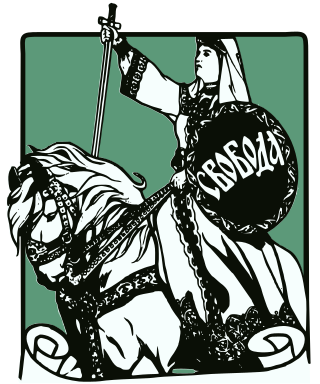
The Constitutional Democratic Party, also called Constitutional Democrats and formally the Party of People's Freedom, was a political party in the Russian Empire that promoted Western constitutional monarchy—among other policies—and attracted a base ranging from moderate conservatives to mild socialists. Party members were called Kadets from the abbreviation K-D of the party name. Konstantin Kavelin's and Boris Chicherin's writings formed the theoretical basis of the party's platform. Historian Pavel Miliukov was the party's leader throughout its existence.
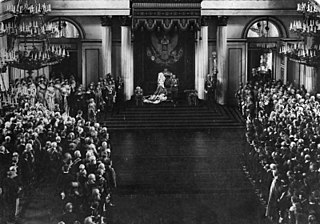
The Russian Constitution of 1906 refers to a major revision of the 1832 Fundamental Laws of the Russian Empire, which transformed the formerly absolutist state into one in which the emperor agreed for the first time to share his autocratic power with a parliament. It was enacted on 6 May [O.S. 23 April] 1906, on the eve of the opening of the first State Duma. This first-ever Russian Constitution was a revision of the earlier Fundamental Laws, which had been published as the Code of Laws of the Russian Empire in 1832. It was granted during the Russian Revolution of 1905, in a last-ditch effort by the imperial government to preserve its own existence and keep the empire from disintegration.

The State Duma is the lower house of the Federal Assembly of Russia. It was established by the Constitution of the Russian Federation in 1993.
The Union of 17 October, commonly known as the Octobrist Party, was a liberal-reformist constitutional monarchist political party in late Imperial Russia. It represented moderately right-wing, anti-revolutionary, and constitutionalist views.

The Federation Council, unofficially Senate, is the upper house of the Federal Assembly of Russia. It was established by the Constitution of the Russian Federation in 1993.

Alexander Ivanovich Guchkov was a Russian politician, Chairman of the Third Duma and Minister of War in the Russian Provisional Government.

The Chairman of the State Duma of the Federal Assembly of the Russian Federation, also informally called Speaker (спикер), is the presiding officer of the lower house of the Russian parliament. It is the fourth highest position, after the President, the Prime Minister and the Chairman of the Federation Council, in the government of Russia. His responsibilities include overseeing the day-to-day business of the State Duma, presiding and maintaining order at the regular sessions of the parliament. The Speaker also chairs the Council of the Duma which includes representatives from all the parliamentary parties and determines the legislative agenda.

Vasily Alekseyevich Maklakov was a Russian student activist, a trial lawyer and liberal parliamentary deputy, an orator, and one of the leaders of the Constitutional Democratic Party, notable for his advocacy of a constitutional Russian state. He served as deputy in the (radical) Second, and conservative Third and Fourth State Duma. According to Stephen F. Williams Maklakov is "an inviting lens to which to view at the last years of Tsarism".
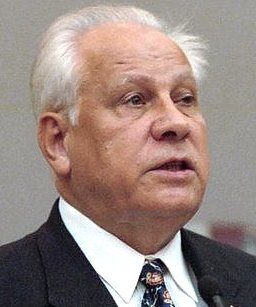
Anatoly Ivanovich Lukyanov was a Russian Communist politician who was the Chairman of the Supreme Soviet of the USSR between 15 March 1990 and 4 September 1991. One of the founders of the Communist Party of the Russian Federation (CPRF) in 1993, he was described by its leader Gennady Zyuganov as having been the Deng Xiaoping of the party. He published books of poetry under his own name and under the pseudonyms Osenev (Осенев) and Dneprov (Днепров).

The State Duma, also known as the Imperial Duma, was the lower house of the legislature in the Russian Empire, while the upper house was the State Council. It held its meetings in the Tauride Palace in Saint Petersburg. It convened four times between 27 April 1906 and the collapse of the empire in February 1917. The first and the second dumas were more democratic and represented a greater number of national types than their successors. The third duma was dominated by gentry, landowners, and businessmen. The fourth duma held five sessions; it existed until 2 March 1917, and was formally dissolved on 6 October 1917.

Legislative elections were held in the Russian Empire from 26 March to 20 April 1906. At stake were the 497 seats in the State Duma of the Russian Empire, the legislative assembly. Election for the First State Duma, which only ran from 27 April to 8 July (O.S.) 1906, returned a significant bloc of moderate socialists and two liberal parties which demanded further reforms. For this reason, it is sometimes called the Duma of Public Anger.

The Vyborg Manifesto ; also called the Vyborg Appeal) was a proclamation signed by several Russian politicians, primarily Kadets and Trudoviks) of the dissolved First Duma on 22 July [O.S. 9 July] 1906.

Fyodor Aleksandrovich Golovin was a Russian politician. He was among the founders of the Constitutional Democratic Party and was chairman of the short-lived second convocation of the Imperial Russian Duma, which was in session from February 1907 to June 1907.
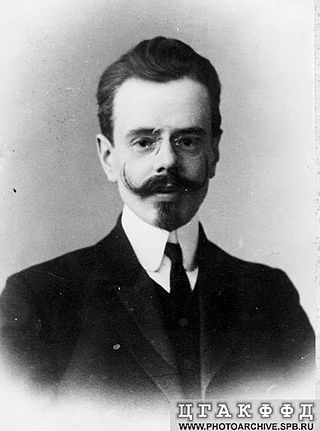
Fyodor Fyodorovich Kokoshkin was a Russian lawyer and politician, author of seminal works on jurisprudence, the First Russian State Duma deputy, and a founding member of the Russian Constitutional Democratic Party and the Controller general of the Russian Provisional Government. The playwright Fyodor Kokoshkin was his grandfather.

Maxim Moisseyevitsch Vinaver was a Russian lawyer, politician, and patron.

Petras Leonas (1864–1938) was a Lithuanian attorney and politician, the first Minister of Justice of the newly independent Lithuania in 1918.
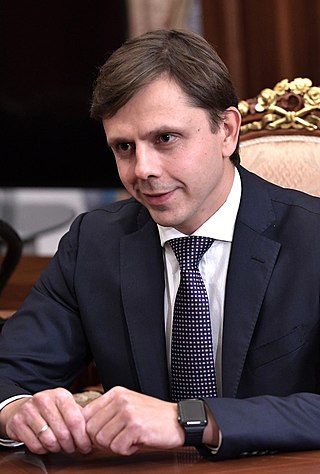
Andrey Yevgenyevich Klychkov, is a Russian state and political figure, and a lawyer. He is currently serving as the Governor of Oryol Oblast since 5 October 2017. Previously he was a Deputy of the Moscow City Duma.